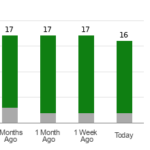
Tesla, Inc. stock took a nearly 6% hit in pre-market trading following disappointing delivery numbers for the first quarter. Tesla’s production of 433,000 vehicles fell short of expectations with only 387,000 deliveries. The shortfall raises concerns over the sustainability of Tesla’s premium valuation.
The company’s 387,000 deliveries missed the FactSet consensus of 457,000 and lagged behind the 484,507 vehicles delivered in the previous three quarters of 2023 and the 422,875 deliveries in the first quarter of 2023.
Investors are wary of Tesla’s dwindling market share in China, highlighted by the company’s modest 0.2% year-over-year growth in March sales. In contrast, overall EV sales in China surged by nearly 33%, with BYD leading the way by selling over 300,000 vehicles, marking a 46% increase compared to the previous year.
Challenges in the EV Market Persist
The hurdles facing Tesla are not exclusive to the company but emblematic of broader industry challenges. An oversupply of vehicles outpacing demand is a prevailing concern. While Tesla’s valuation may be under scrutiny, it remains a standout performer in an underwhelming sector.
Tesla’s ability to deliver vehicles at scale profitably sets it apart, especially compared to struggling competitors like Fisker Inc. (FSR) and Canoo Inc. (GOEV) navigating difficulties in establishing themselves in a high-interest rate environment.
Nevertheless, Tesla now contends with competition both internationally and domestically. The resurgence of hybrid vehicles is diverting consumer interest, benefiting companies like Toyota Motor Corp. (TM) whose stock has seen notable gains.
Moreover, Tesla faces pressure as its vehicles appear dated in comparison to newer features offered by competitors. The challenge lies in the execution of these visions into tangible products.
Assessing Tesla’s Investment Appeal
Tesla remains a pivotal player within the EV ecosystem, noted for its EV charging infrastructure. Despite recent setbacks, the company’s importance in the industry persists. The looming question is whether Tesla’s stock presents a buying opportunity amid the recent downturn.
With TSLA stock testing support levels near its 52-week low and apprehensions mounting ahead of its upcoming earnings report on April 17, the downward trend may persist. Additionally, a rise in short interest by over 6% in the past month suggests further downside potential.
There’s a possibility that TSLA stock could plummet to its 5-year low, reaching around $112 per share. Such a scenario would translate to a substantial 32% discount from its current price and an approximately 80% drop from its 52-week peak.
The article “Tesla Stock Drops on Weak Delivery Numbers and it May Fall More” first appeared on MarketBeat.






